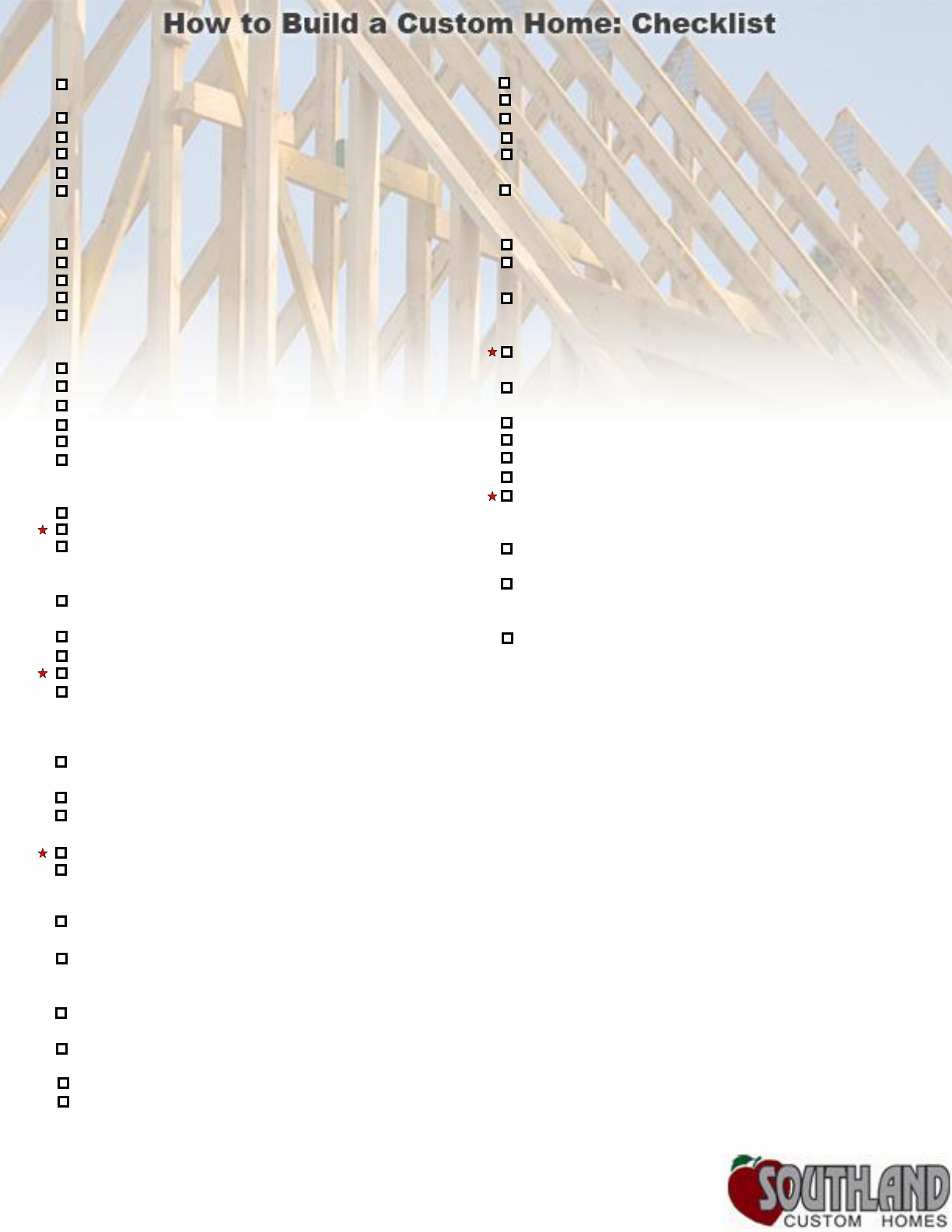
Here, in checklist form, are all the steps of building
your home. The asterisk by the numbers mean that
the Building Inspector must check the work at this
stage before construction can continue.
( = Indicates inspection may be required at this time.)
It’s Much Easier With Southland Custom Homes
We specialize in building custom homes for a wide
variety of buyers. We build board-by-board – no pre-
fab or modular construction – and, since 1980, have
built more than 3,000 dream homes! Some
customers have us complete their home 50% to the
Shell stage. Others want us to build the house 100%,
ready for move-in. We do either or any stage in
between.
We have arranged the work steps so they
approximately match the completion state: 50%
(Shell), Steps 1-10; 95% complete, Steps 1-16; and
100% complete, Steps 1-20.
Step 1: Buying Land
1. Frontage on County road
2. Land Survey
3. Title Search
4. Title Insurance
5. Water Table for Well
6. Septic System Soil Test
7. Solar Heat
8. Land easily improved?
Step 2: Before Closing
9. Review Loan Documents
10. Prepare Specifications Sheet
11. Prepare complete Materials/ Labor Cost Estimates
(“Take Offs”)
12. Submit Loan Application
13. Sewer Tap (or Septic System Permit)
14. Building Permit
15. Construction Loan Closing
Step 3: After Closing
16. Building License required?
17. Compliance Bond required?
18. Water Tap & Meter (or contact Well Digger)
19. Order Temporary Services
Electricity
Water (if no well)
20. Prepare Site Plan
Step 4: Subcontractors
21. Check References
22. Are they Bonded?
23. Are they Licensed?
24. Guarantee their work?
25. If Guaranteed, How Long?
26. Liability Insurance
27. Workman’s Compensation Insurance
28. Who do Better Builders Use?
29. Get Written Estimates
30. Check Low Bidder’s quality
Step 5: Buying Materials
31. Select 3 reputable Building Supply firms
32. Submit Material Estimates to each
33. Check supply house Bid against original estimates
and correct difference
34. Select Building Supply firm with best combination
of Service, Terms and Price
Step 6: Site & Foundation
35. Review Step 3, then do Rough Grading
36. Cut Driveway
37. Put 4”-6” Gravel on Driveway
38. Get Water Meter (or Dig Well)
39. Clear Home Site, plus 10’ – 15’ Work Area
40. Install Temporary Power Pole
41. Crawl Space or Basement
Batter Boards
Dig Foundation Footings
Pour Footings
Lay Block or Pour Walls
42. Pre-Treat for termites
43. Waterproof/Backfill
44. Slab and Garage
Form Boards
Plumbing
Miscellaneous Pipes
Gravel
Polyethylene vapor barrier
Pre-Wire (landscape)
Pour Concrete
45. Spot Foundation Survey
46. Gas, Sewer & Miscellaneous Utility lines
Step 7: Framing
47. Buy Building Level
48. Check Foundation Level/ Square
49. Check Level/ Square Again
50. Have Framing Materials Delivered
51. Maintain Materials Supply
52. “Cull” Materials
53. Basement Walls & Beams
54. Subfloor, 1
st
Floor
55. Set Special Tubs, 1
st
Floor
56. Walls/ Partitions, 1
st
Floor
57. Subfloor, 2
nd
Floor
58. Set Special Tub, 2
nd
Floor
59. Walls/ Partitions, 2
nd
Floor
60. Wall Sheathing
61. Check Level, Square & Layout as work progresses
62. Ceiling Joists
63. Rafters & Trusses
64. Roof Sheathing and Felt
65. Framing Inspection
66. Install Doors/Windows
67. Measure Cabinets

Step 8: Exterior Masonry/Miscellaneous Tasks
68. Schedule Delivery of Exterior Windows, Doors,
Siding, Trim
69. Install Doors (if not done in framing)
70. Install Windows (if not done in framing)
71. Install factory built Fireplace
72. Miscellaneous Rough Frame and Deadwood
73. Install Brick/Stone (if any is specified)
Step 9: Roofing
74. Install Roofing as soon as possible
75. Check Horizontal Roof Shingle Lines
76. Align Shingles’ Vertical Splits
77. Four (4) Nails Per Shingle
78. Stagger Metal Flashing
Step 10: Cornice & Siding
79. Check Siding manufacturer’s Nailing Instructions
80. Check Siding as it’s installed
81. Check installation of Flashing
82. Install Garage Doors
83. Exterior Pain/ Stain
84. Clean Up
Step 11: Plumbing Rough
85. Specify Plastic or Copper Pipe
86. Rough-In for Bath, Kitchen, etc.
87. Pay only after work is inspected
Step 12: Heating & Cooling Rough
88. Take Floorplan to Power Company for size of
system
89. Smaller system is usually more efficient
90. For bigger house, consider using multiple systems
91. Rough-In Heating/ Cooling
92. Get Rough-In approved by Building Inspector
before making payment
Step 13: Electrical Rough
93. Make sketch of furniture in each room, showing
outlets & switches.
94. Get approved for proposed (Wiring Plan)
95. Get Power Company to recommend how much
Amp Service is needed
96. Rough-In Wiring
97. Pay for Rough-In only after inspection
Step 14: Insulation
98. Get Power Company to determine amount of R
Value & Insulation needed
99. With blow-in Insulation, do not block soffit vents
Step 15: Ceiling & Wall Covering
100. If you install Drywall yourself, let contractor give
it a smooth finish
101. ½” Drywall is recommended for 16” on-center
studs
102. Stipple Ceilings before painting walls
103. Clean the Interior
Step 16: Trim & Cabinets
104. Hire a Master Carpenter
105. Select either Stain or Paint Grade Trim
106. Allow ½” space under baseboard for Carpet
107. Install Interior Doors & Kitchen/ Bath, Cabinets
108. Recommend caulking around window & door
trim, inside & out
109. Finish the Fireplace
Step 17: Interior Paint & Wallpaper
110. Paint Interior walls & trim
111. Over Drywall, use one coat of primer & two
finish coats.
112. Put up wallpaper
Step 18: Final Finish & Trim
113. Call back Plumbing, Electrical, & Heating/
Cooling Contractors for Final Work
114. After final inspection, utilities can be turned on
(Power may be required prior to final inspection)
115. Install Tile, Hardwood, Carpet & Vinyl
116. Install Mirrors & Bath Accessories
117. Install Gutters and Screens
118. Landscaping, Drives, Walks, Patio, etc.
119. Final Inspection
Step 19: Final Clean Up
120. Fix little nicks, touch up paint, clean windows,
floors, etc.
121. Install Appliances
Step 20: Move-In
122. Move in & enjoy your new home!
